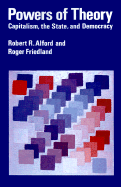Book contents
- Frontmatter
- Contents
- Preface
- Acknowledgments
- Introduction: State and society in theoretical perspective
- 1 Theoretical perspectives as modes of inquiry
- PART I THE PLURALIST PERSPECTIVE
- PART II THE MANAGERIAL PERSPECTIVE
- 7 State and society in managerial perspective
- 8 The bureaucratic state and centralization
- 9 The bureaucratic state and fragmentation
- 10 The managerial perspective on the capitalist state
- 11 The managerial perspective on the democratic state
- PART III THE CLASS PERSPECTIVE
- PART IV THEORY, POLITICS, AND CONTRADICTIONS IN THE STATE
- Glossary
- Bibliography
- Name index
- Subject index
9 - The bureaucratic state and fragmentation
Published online by Cambridge University Press: 01 June 2011
- Frontmatter
- Contents
- Preface
- Acknowledgments
- Introduction: State and society in theoretical perspective
- 1 Theoretical perspectives as modes of inquiry
- PART I THE PLURALIST PERSPECTIVE
- PART II THE MANAGERIAL PERSPECTIVE
- 7 State and society in managerial perspective
- 8 The bureaucratic state and centralization
- 9 The bureaucratic state and fragmentation
- 10 The managerial perspective on the capitalist state
- 11 The managerial perspective on the democratic state
- PART III THE CLASS PERSPECTIVE
- PART IV THEORY, POLITICS, AND CONTRADICTIONS IN THE STATE
- Glossary
- Bibliography
- Name index
- Subject index
Summary
Fragmentation is the other side of state centralization, indicating a loss of elite capacity to rule and, in extreme situations, leading to revolutionary transformations of state power. In this chapter we deal with managerial analyses of state fragmentation at each level of analysis.
Breakdown of elite capacity: the societal level
In the managerial perspective, the ultimate form of fragmentation is the emergence of multiple centers of state authority, which can degenerate into civil war and/or revolution (Tilly 1975). Managerial analysts debate the organizational characteristics of the state that expand or limit its structural power – that is, the size and capacities of the army or how much control dominant classes have over state revenues. Issues within the perspective also revolve around the comparative importance of the ideology of revolutionary elites based in dissident regions or cities as compared with the internal cohesion or fragmentation of state elites as the structural factors leading to revolution.
The managerial explanation of civil war and revolution differs dramatically from a focus on the role of struggle between ascendant classes based on developing productive forces and declining classes based on obsolete relations of production (see Zeitlin 1984). It also differs sharply from an emphasis on the perils of too rapid modernization relative to political development, the absence of normative consensus between leaders and led, and popular expectations that rise too rapidly (Gurr 1970).
Information
- Type
- Chapter
- Information
- Powers of TheoryCapitalism, the State, and Democracy, pp. 202 - 222Publisher: Cambridge University PressPrint publication year: 1985
